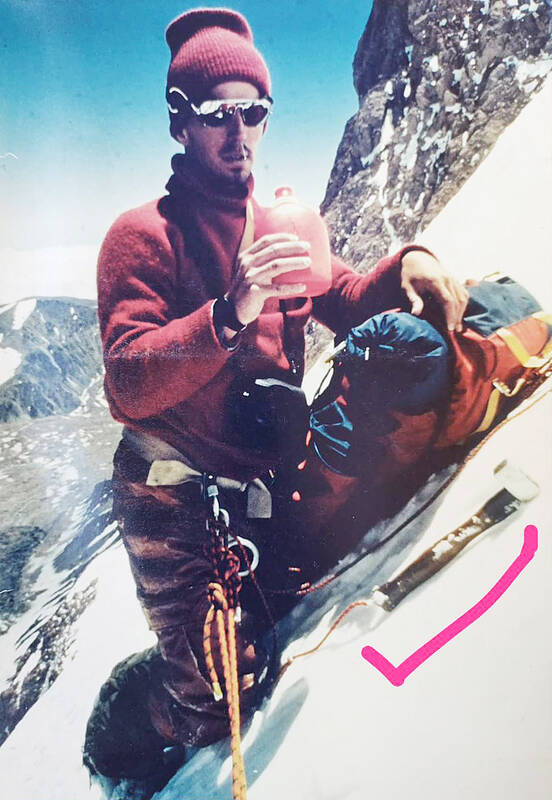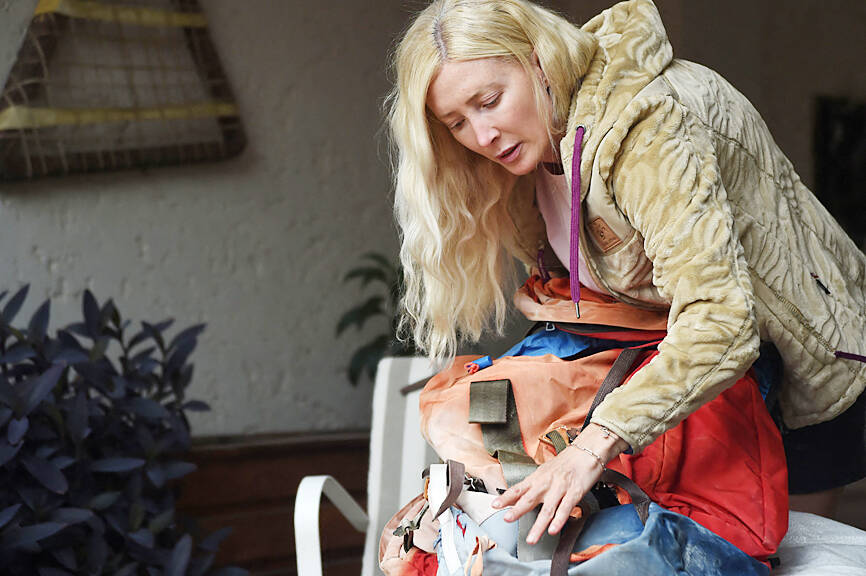Two daughters of an Argentine mountaineer who died on an icy peak 40 years ago have retrieved his backpack from the spot — finding camera film inside that allowed them a glimpse of some of his final experiences.
Guillermo Vieiro was 44 when he died in 1985 — as did his climbing partner — while descending Argentina’s Tupungato lava dome, one of the highest peaks in the Americas.
Last year, his backpack was spotted on a slope by mountaineer Gabriela Cavallaro, who examined it and contacted Vieiro’s daughters Guadalupe, 40, and Azul, 44.

Photo: AFP / Gentileza Familia Vieiro y Familia Rabal
Last month, the three set out with four other guides and two filmmakers on an 11-day journey to recover the bag from an altitude of about 6,100m — close to the summit of the 6,600m volcanic peak.
“In my family, the word ‘mountain’ was always forbidden. My mother wants nothing to do with the discovery of this backpack. It’s a family that has been broken by grief, by the void,” said Azul Vieiro, who was just four years old when her father died. “It all seemed crazy to me and I didn’t want to go back to the volcano where he had died, but as the months went by ... I started to loosen up, and began thinking: ‘Why not?’”
Inside the backpack, the women found a jacket, a sleeping bag, a water bottle, aspirin, vitamin C tablets, a set of knives and two rolls of film that had belonged to their father.

Photo: AFP
“Spiritually, it felt like a greeting, like: ‘I’m still here, I exist. You’re not alone,’” Azul Vieiro said.
The experience also allowed her to learn more about a man she never got a chance to know.
“My mother never really told us who he was,” she said. “We knew he had died in the mountains and that he was a mountaineer, but not much more than that. So, it was like rediscovering his story, like saying: Wait ... we have a father who had a life, a history. So it was like discovering him all over again.”
Photographs taken from other film found inside the same backpack by Cavallaro a year earlier showed that Guillermo Vieiro and his partner, Leonardo Rabal, 20, had been the first climbers to reach the top of Tupungato from its eastern side — the most challenging route.
“That slope has never been scaled again,” said Cavallaro, who lives at the foot of Tupungato in the city of the same name. “What they [Guillermo Vieiro and Rabal] accomplished has real historical value in Argentine and international mountaineering.”
The bodies of Guillermo Vieiro and Rabal were recovered shortly after they died.
Azul Vieiro and her sister said they would donate their father’s belongings in an attempt to share a “piece of Argentine mountaineering history” with others.

Yemen’s separatist leader has vowed to keep working for an independent state in the country’s south, in his first social media post since he disappeared earlier this month after his group briefly seized swathes of territory. Aidarous al-Zubaidi’s United Arab Emirates (UAE)-backed Southern Transitional Council (STC) forces last month captured two Yemeni provinces in an offensive that was rolled back by Saudi strikes and Riyadh’s allied forces on the ground. Al-Zubaidi then disappeared after he failed to board a flight to Riyadh for talks earlier this month, with Saudi Arabia accusing him of fleeing to Abu Dhabi, while supporters insisted he was

The Chinese Embassy in Manila yesterday said it has filed a diplomatic protest against a Philippine Coast Guard spokesman over a social media post that included cartoonish images of Chinese President Xi Jinping (習近平). Philippine Coast Guard spokesman Jay Tarriela and an embassy official had been trading barbs since last week over issues concerning the disputed South China Sea. The crucial waterway, which Beijing claims historic rights to despite an international ruling that its assertion has no legal basis, has been the site of repeated clashes between Chinese and Philippine vessels. Tarriela’s Facebook post on Wednesday included a photo of him giving a

‘MOBILIZED’: While protesters countered ICE agents, Minnesota Governor Tim Walz activated the state’s National Guard to ‘support the rights of Minnesotans’ to assemble Hundreds of counterprotesters drowned out a far-right activist’s attempt to hold a small rally in support of US President Donald Trump’s latest immigration crackdown in Minneapolis, Minnesota, on Saturday, as the governor’s office announced that National Guard troops were mobilized and ready to assist law enforcement, although not yet deployed to city streets. There have been protests every day since the US Department of Homeland Security (DHS) ramped up immigration enforcement in the Twin Cities of Minneapolis and Saint Paul by bringing in more than 2,000 federal officers. Conservative influencer Jake Lang organized an anti-Islam, anti-Somali and pro-US Immigration and Customs Enforcement

NASA on Saturday rolled out its towering Space Launch System (SLS) rocket and Orion spacecraft as it began preparations for its first crewed mission to the Moon in more than 50 years. The maneuver, which takes up to 12 hours, would allow the US space agency to begin a string of tests for the Artemis 2 mission, which could blast off as early as Feb. 6. The immense orange and white SLS rocket, and the Orion vessel were slowly wheeled out of the Vehicle Assembly Building at the Kennedy Space Center in Florida, and painstakingly moved 6.5km to Launch Pad 39B. If the